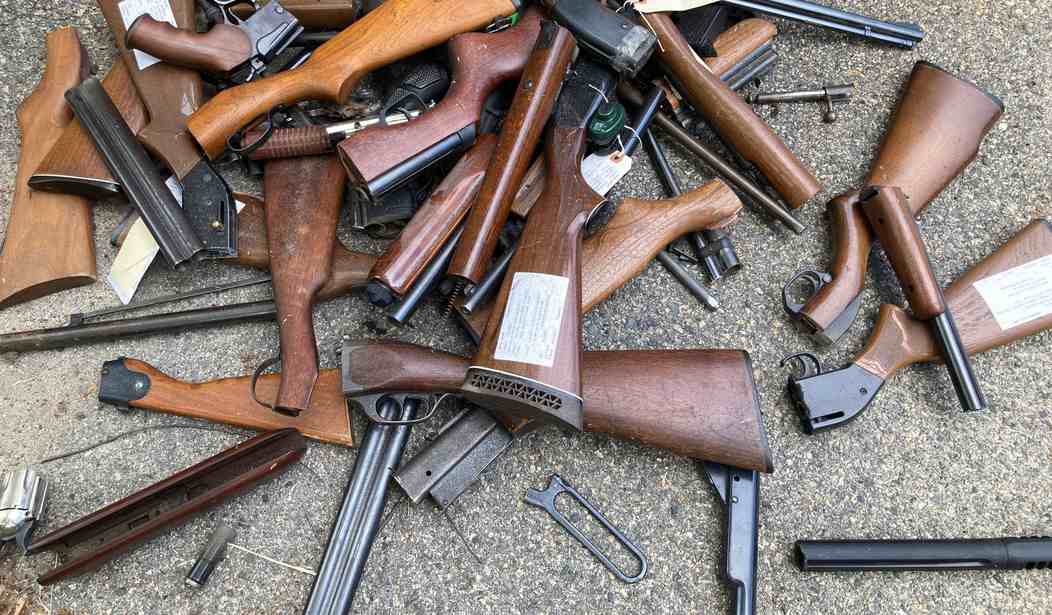It’s been three years since New Zealand’s sweeping ban on semi-automatic firearms took effect, with a six-month long “buyback” that resulted in about 56,000 guns being turned over to police in a compensated confiscation scheme that officials promised would make the country a much safer place. That’s plenty of time for the ban to have had an impact on the country’s crime rates, but so far there’s not much evidence that the disarmament effort has made a difference.
In fact, according to the country’s latest crime statistics, things seem to be getting worse.
Rates of injury and death caused by firearms are tracking higher than ever before.
Data released by police under the Official Information Act shows 10 murder or manslaughter deaths in 2022, up until 31 July. There were 11 in total in 2021.
Injuries are also running at a record rate, on track to exceed 300 firearm-related injuries for the first time. In 2021, there were 298 gun-related injuries recorded by police, the highest ever.
That was despite a year on year drop in the number of firearms-related crimes police have had to deal with.
In 2021, police dealt with 3683 firearms-related offences, down 7 percent on the previous year. Up until 31 July, those figures are tracking 1 percent lower again.
It shows a growing willingness of people to use their guns against other people.
The problem is particularly big in Auckland.
Over the past 12 months, police have attended 4 percent more jobs where guns are involved than the previous 12 months, and there was a 74 percent increase in injuries.
If you compare the past 12 months to a decade earlier, there was a 53 percent increase in gun crime, and a 327 percent increase in injuries caused by guns.
According to gun control advocates, this shouldn’t be happening. Under their theory that more guns equals more crime, taking 56,000 guns out of circulation should have led to a dramatic reduction in firearm-related offenses. Instead, gun-involved crime is up by more than 50% compared to a decade ago, when the nation was supposedly (to borrow a phrase from Joe Biden) “awash in weapons of war.”
So what’s driving the increased violence in New Zealand? Well, just like here in the United States, it appears that criminals had no interest in giving up their guns when the government demanded they hand them over.
Auckland City councillor Alf Filipaina said he was not surprised by the figures; they backed up the feeling of the community.
He said the rise in gun crime has coincided with Australia’s policy of deporting 501s to New Zealand, and the rise of new gangs such as the Comancheros.
In the past year, growing tensions between the Killer Beez and the Tribesmen have also seen a large number of shootings.
Filipaina said that had now eased, thanks to efforts of community leaders.
“The truce they’ve come to seems to have put the issues around Tāmaki and towards Northland to bed,” he said.
“I wasn’t involved, but some of our community leaders met with the gangs and made it clear to them that this wasn’t good for our community, for our people.
“They’re a part of our community, they did need to be reminded of that, and they seem to have listened.”
Asked about people being more willing to use their firearms than before, Filipaina said it was something he worried about.
“That was the trend I was seeing on the streets,” he said. “Not only are they more likely to be carrying, but they seem pretty happy to use them.”
Back in 2019, New Zealand’s “buyback” was widely praised by gun control activists and Democratic politicians here in the United States, but I haven’t heard much talk from the anti-gun crowd about how things have played out over the past couple of years, and I’ve got a pretty good guess as to why that’s the case. As Democrats from Joe Biden on down press for a ban on so-called assault weapons here at home, however, it’s worth pointing out what happened in the last country to implement a widespread prohibition on semi-automatic firearms; record-high numbers of firearm-related injuries and deaths. –
Even if a ban on the most commonly-owned rifles in the U.S. was constitutional (and it’s not), it would be completely ineffective when it comes to crime and public safety. Semi-automatic rifles aren’t used in many crimes to begin with, so banning them would have little effect on violent crime rates (as we saw when Biden’s 1994 ban was in place). Criminals will still primarily use handguns, and they’ll continue to get them mostly through illegal means. Want to reduce crime? It can be done, but it starts by focusing on the trigger-pullers instead of the firearm itself.










